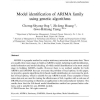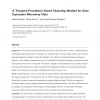70 search results - page 9 / 14 » A simple method of forecasting based on fuzzy time series |
TFS
2008
13 years 7 months ago
2008
Abstract--This study proposes an efficient self-evolving evolutionary learning algorithm (SEELA) for neurofuzzy inference systems (NFISs). The major feature of the proposed SEELA i...
GECCO
2008
Springer
13 years 8 months ago
2008
Springer
Single and multi-step time-series predictors were evolved for forecasting minimum bidding prices in a simulated supply chain management scenario. Evolved programs were allowed to ...
KDD
2012
ACM
11 years 10 months ago
2012
ACM
Historical prices are important information that can help consumers decide whether the time is right to buy a product. They provide both a context to the users, and facilitate the...
AMC
2005
13 years 7 months ago
2005
ARIMA is a popular method to analyze stationary univariate time series data. There are usually three main stages to build an ARIMA model, including model identification, model est...
BMCBI
2010
13 years 7 months ago
2010
Background: Time-course microarray experiments can produce useful data which can help in understanding the underlying dynamics of the system. Clustering is an important stage in m...


